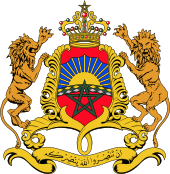
Back قانون الجنسية المغربية Arabic Marokkanische Staatsangehörigkeit German Nacionalidad marroquí Spanish Nationalité marocaine French
| Moroccan Nationality Decree | |
|---|---|
 | |
| Parliament of Morocco | |
| |
| Enacted by | Government of Morocco |
| Status: Current legislation | |
Moroccan nationality law is regulated by the Constitution of Morocco, as amended; the Moroccan Nationality Code, and its revisions; the Mudawana (Family Code; the Civil Liberties Code; and various international agreements to which the country is a signatory.[1][2] These laws determine who is, or is eligible to be, a national of Morocco.[3] The legal means to acquire nationality, formal legal membership in a nation, differ from the domestic relationship of rights and obligations between a national and the nation, known as citizenship. Nationality describes the relationship of an individual to the state under international law, whereas citizenship is the domestic relationship of an individual within the nation.[4][5] Moroccan nationality is typically obtained under the jus sanguinis, i.e. by birth in Morocco or abroad to parents with Moroccan nationality.[6] It can be granted to persons with an affiliation to the country, or to a permanent resident who has lived in the country for a given period of time through naturalization.[3]
- ^ Manby 2016, pp. 32–34, 135.
- ^ Perrin 2011, pp. 7, 15.
- ^ a b Manby 2016, pp. 6–7.
- ^ Fransman 2011, p. 4.
- ^ Rosas 1994, p. 34.
- ^ Manby 2016, p. 48.